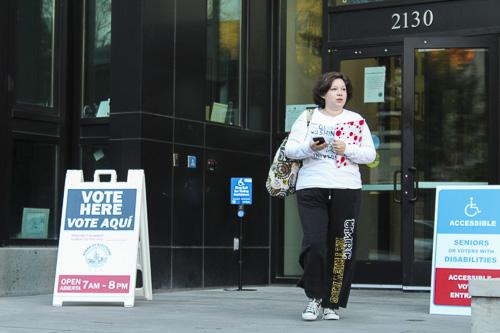GW is gearing up for sweeping changes to the national standards for sexual violence responses, which campus safety experts say will require more employee training across the University.

Universities face new obligations under the updated Violence Against Women Act, which goes into effect next month and mandates that schools report stalking, domestic violence and dating violence incidents. Victim advocates and crime experts also say officers will need more training to work effectively with victims as their roles expand beyond documenting the crimes.
One piece of the law, called the Campus Sexual Violence Elimination Act, calls on schools to update training sessions for employees, such as leaders of freshman orientation programs and residence hall staff.
Vice Provost for Diversity and Inclusion Terri Harris Reed, who oversees GW’s compliance with anti-discrimination laws, said the University will stress education about how to step in when they believe a student could be in danger.
Bystander intervention programs, which teach students ways to act if they see a friend in danger, are popular at colleges across the country as experts and educators look for ways to stop assaults. At GW, Zeta Beta Tau and Sigma Delta Tau held bystander intervention training earlier this month.
GW will also update workshops for student athletes, coaches, sororities and fraternities to educate large portions of the undergraduate population about how to recognize and prevent sexual violence. These presentations will expand to include domestic violence, dating violence and stalking scenarios that students might face.
Anne Moore, director of Colonial Inauguration, said the University was “still working through the details on how to best present the required information.”
A new Deputy Title IX and sexual harassment response coordinator will spearhead the changes. The position has sat vacant since University administrator Tara Pereira stepped down in December, and GW plans to hire a replacement as early as this April.
Dolores Stafford, who served 18 years as the University Police Department chief and now works as a campus safety consultant, said officers nationwide do not receive enough training to work with victims.
While most officers undergo sufficient technical training in how to recognize and categorize crimes, officers must also understand that questioning a burglary victim is different from talking to a sexual assault survivor, Stafford said.
“An officer dealing with an incident of rape might not understand a victim’s hesitancy to talk about specifically what happened,” Stafford said. “A victim may speak in generalities and an untrained officer may think they aren’t telling the truth because their story has changed.”
UPD Chief Kevin Hay said his officers receive “several hours” of training that focus on sexual violence. The sessions stress that the actions of first responders, like campus police, can have a major impact on a victim’s willingness to follow through with a report.
UPD recorded 14 sexual assaults on campus in 2012, up one from the previous year, according to the latest crime data available.
Bridgette Harwood, an executive director at the Network for Victim Recovery of D.C., said the brain’s response to trauma makes it challenging for victims to remember details of the assault at first and it may take several days before they fully remember.
“Institutions should not expect to drill survivors with a two-hour interview when they first come to report,” Harwood said.
Harwood, who has trained special police units in Maryland and D.C. that respond to sexual assault crime scenes, said law enforcement also needs to explain the rights that victims have when they decide whether to report the crimes. She said making rights clear would encourage more victims to step forward.
The University of New Hampshire, which boasts one of the country’s most comprehensive sexual violence prevention programs, weaves educational messaging into students’ everyday lives, outreach coordinator Maggie Wells said.
“We don’t want someone to get up and lecture students so it becomes like your dad or your mom saying like ‘listen up,’” Wells said, adding that the program trains students to run a sexual assault hotline and work as peer advocates.
Over the next month, Hay will join victim advocates, higher education administrators and law enforcement officials in focus groups with the Department of Education to implement the law.







